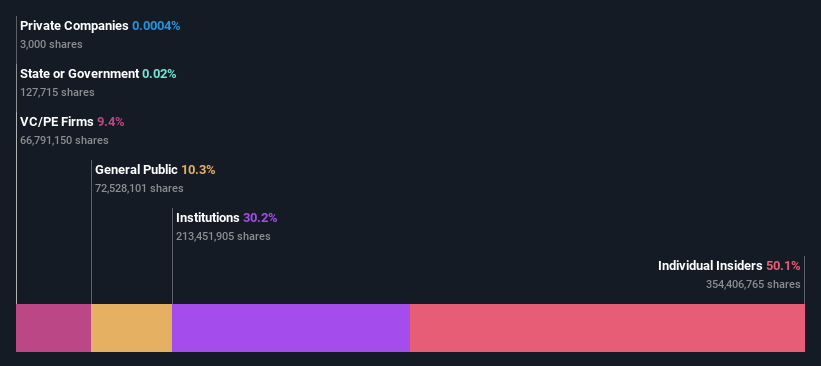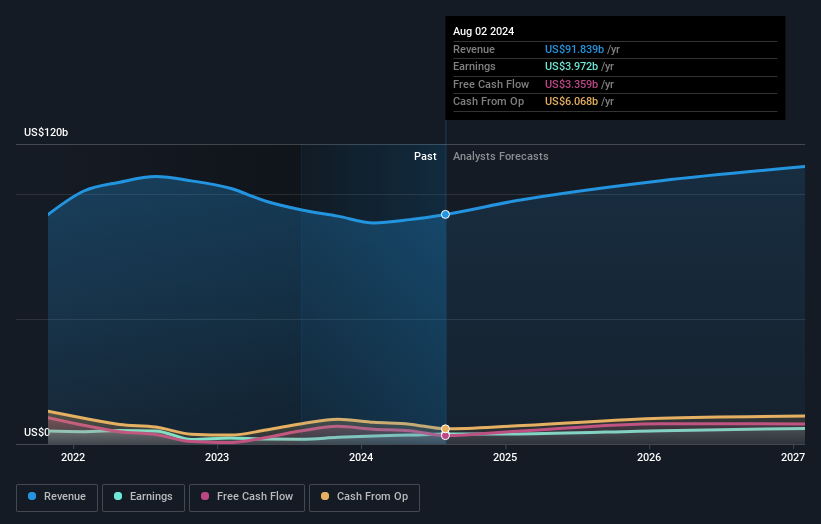Despite selling recently, Dell Technologies Inc. (NYSE:DELL) insiders own 50% stake and recent decline might have cost them
Key Insights
Insiders appear to have a vested interest in Dell Technologies' growth, as seen by their sizeable ownership
59% of the business is held by the top 2 shareholders
Every investor in Dell Technologies Inc. (NYSE:DELL) should be aware of the most powerful shareholder groups. The group holding the most number of shares in the company, around 50% to be precise, is individual insiders. In other words, the group stands to gain the most (or lose the most) from their investment into the company.
And our data suggests that insiders own the top position in the company’s share registry despite recent sales. As market cap fell to US$72b last week, they would have faced the highest losses than any other shareholder groups of the company.
Let's delve deeper into each type of owner of Dell Technologies, beginning with the chart below.
View our latest analysis for Dell Technologies
What Does The Institutional Ownership Tell Us About Dell Technologies?
Institutional investors commonly compare their own returns to the returns of a commonly followed index. So they generally do consider buying larger companies that are included in the relevant benchmark index.
As you can see, institutional investors have a fair amount of stake in Dell Technologies. This implies the analysts working for those institutions have looked at the stock and they like it. But just like anyone else, they could be wrong. When multiple institutions own a stock, there's always a risk that they are in a 'crowded trade'. When such a trade goes wrong, multiple parties may compete to sell stock fast. This risk is higher in a company without a history of growth. You can see Dell Technologies' historic earnings and revenue below, but keep in mind there's always more to the story.
We note that hedge funds don't have a meaningful investment in Dell Technologies. The company's CEO Michael Dell is the largest shareholder with 49% of shares outstanding. With 9.4% and 2.5% of the shares outstanding respectively, Silver Lake Technology Management, L.L.C. and The Vanguard Group, Inc. are the second and third largest shareholders.
To make our study more interesting, we found that the top 2 shareholders have a majority ownership in the company, meaning that they are powerful enough to influence the decisions of the company.
While studying institutional ownership for a company can add value to your research, it is also a good practice to research analyst recommendations to get a deeper understand of a stock's expected performance. There are a reasonable number of analysts covering the stock, so it might be useful to find out their aggregate view on the future.
Insider Ownership Of Dell Technologies
The definition of an insider can differ slightly between different countries, but members of the board of directors always count. The company management answer to the board and the latter should represent the interests of shareholders. Notably, sometimes top-level managers are on the board themselves.
Most consider insider ownership a positive because it can indicate the board is well aligned with other shareholders. However, on some occasions too much power is concentrated within this group.
It seems that insiders own more than half the Dell Technologies Inc. stock. This gives them a lot of power. Given it has a market cap of US$72b, that means insiders have a whopping US$36b worth of shares in their own names. It is good to see this level of investment. You can check here to see if those insiders have been selling any of their shares.
General Public Ownership
The general public-- including retail investors -- own 10% stake in the company, and hence can't easily be ignored. This size of ownership, while considerable, may not be enough to change company policy if the decision is not in sync with other large shareholders.
Private Equity Ownership
Private equity firms hold a 9.4% stake in Dell Technologies. This suggests they can be influential in key policy decisions. Some investors might be encouraged by this, since private equity are sometimes able to encourage strategies that help the market see the value in the company. Alternatively, those holders might be exiting the investment after taking it public.
Next Steps:
I find it very interesting to look at who exactly owns a company. But to truly gain insight, we need to consider other information, too. For instance, we've identified 4 warning signs for Dell Technologies that you should be aware of.
Ultimately the future is most important. You can access this free report on analyst forecasts for the company.
NB: Figures in this article are calculated using data from the last twelve months, which refer to the 12-month period ending on the last date of the month the financial statement is dated. This may not be consistent with full year annual report figures.
Have feedback on this article? Concerned about the content? Get in touch with us directly. Alternatively, email editorial-team (at) simplywallst.com.
This article by Simply Wall St is general in nature. We provide commentary based on historical data and analyst forecasts only using an unbiased methodology and our articles are not intended to be financial advice. It does not constitute a recommendation to buy or sell any stock, and does not take account of your objectives, or your financial situation. We aim to bring you long-term focused analysis driven by fundamental data. Note that our analysis may not factor in the latest price-sensitive company announcements or qualitative material. Simply Wall St has no position in any stocks mentioned.


